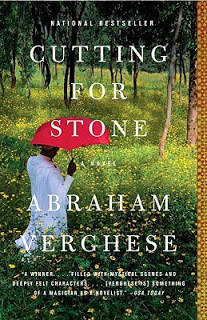CUTTING FOR STONE
By Abraham Verghese
Published February 3, 2009
Marion and Shiva Stone are twin brothers born of a secret union between a beautiful Indian nun and a brash British surgeon at a mission hospital in Addis Ababa. Orphaned by their mother’s death in childbirth and their father’s disappearance, bound together by a preternatural connection and a shared fascination with medicine, the twins come of age as Ethiopia hovers on the brink of revolution. Yet it will be love, not politics—their passion for the same woman—that will tear them apart and force Marion, fresh out of medical school, to flee his homeland. He makes his way to America, finding refuge in his work as an intern at an underfunded, overcrowded New York City hospital. When the past catches up to him—nearly destroying him—Marion must entrust his life to the two men he thought he trusted least in the world: the surgeon father who abandoned him and the brother who betrayed him.
I added this book to my to-read list shortly after it was republished in paperback in 2010. This is a novel that should be on your to-read list as well. But, maybe at a quiet/less busy time. This book is nearly 700 pages and is not what I would call a “quick read”. Our book club chose it for our August book and then had to move it into September as well after only one of our members was able to finish it in that month. I am hoping that others were able to finish it, because they are lots of great discussable topics!
With so many pages, you know this isn’t going to be a fast-moving story. The writer takes his time by sharing history, detail, and gives great emphasis to the relationships in the story. At times, you are thinking, just get on with it. But most of the time, the detail is so beautiful and gives you a full picture of the moment he is sharing.
There were so many pages that I dog-earred due to wonderful quotes in the book. Here are some of my favorites and give you an example of the style Verghese used in his story-telling.
“Hema was told when she first came to Ethiopia that this strange haircut was so that if God chose to take that child (and He took so many), the tuft gave Him a handle by which to lift it to heaven.”
Page 91
“Wasn’t that the definition of home? Not where you are from, but where you are wanted?” Page 95
After the twins were born, Hema, the doctor dismisses the probationers request for circumcision by saying, “What have you been doing all the time, eh? You should have been worring about their swallowing ends, not their watering cans.” Page128
After the twins were born… “Hema felt light-headed, giddy. I won the lottery without buying a ticket, she thought. These two babies plugged a hole in my heart that I didn’t know had until now.”
Page 130
After a disagreement over which Biblical doctrine was better, the Matron of the hospital in Ethiopia states, “God will judge us, Mr Harris, by what we did to relieve the suffering of our fellow human beings. I don’t think God cares which doctrine we embrace.” And then goes on to say, “We need medicine and food. But we get Bibles. I always wondered if the good people who send us Bibles really think that hookworm and hunger are healed by scripture? Our patients are illiterate.” Page 188
“‘Call me old-fashioned,’ Deepak said, ‘but I’ve always believed hard work pays off. My version of the Beatitudes. Do the right thing, put up with unfairness, selfishness, stay true to yourself….one day it all works out. Of course, I don’t know that people who wronged you suffer or get their just desserts. I don’t think it works that way. But I do think one day you get your reward.'” Page 508
There were many other parts of the book that made an impression on me. I was fascinated and learned so much about Third World medicine. I was amazed at what the doctors could accomplish with so little. Death has such a different tone in Ethiopia rather than in America and within America between rich and poor hospitals and one I had never thought about before reading this book.
There are so many discussable topics that this would be a great book club choice. I am looking forward to our discussion next week. I am sure we will hit on topics such as religion, forgiveness, grief, love, betrayal, and immigration.
I give this 4 out of 5 stars and is a book that could be placed on a level with other classic literature. It should be read and talked about.
Posted Under book club, Book Review, fiction

